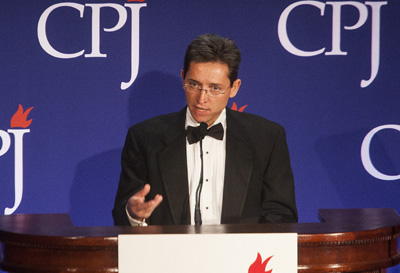The battle for a free press sometimes feels like a war between indignation and intimidation. Journalists learn of abuses of power, crime, or corruption, and–indignant–they speak out. In response, the perpetrators of those abuses–be they government officials or criminals–try to intimidate the journalists into silence with threats, lawsuits, jail, or even murder. Last night, the Committee to Protect Journalists paid tribute to a handful of journalists for whom indignation is a driving force, no matter the scale of intimidation.
“Indignation is what best defines the motivation of those who do this kind of journalism,” Mauri König told a crowd of nearly 900 in New York’s Waldorf-Astoria grand ballroom as he accepted one of CPJ’s International Press Freedom Awards. König is an investigative reporter who has exposed human rights abuses and corruption in his native Brazil, including sex trafficking and kidnapping of Brazilian children for military service in Paraguay. While researching the latter in 2000, König was captured by suspected Paraguayan policemen and severely beaten, strangled, and left for dead. He has been threatened with death several times since, but, he said, “My indignation is greater than my fear.”
Another of CPJ’s award winners, Mae Azango of Liberia, practically exudes indignation. This is directed at former warlords in her once-war-ravaged country; at corrupt and brutal police; and at complacent government officials. But Azango reserves special indignation for the secret societies in Liberia who practice female genital cutting. Reporting on this practice–a taboo subject in Liberia–led to death threats against Azango this spring and forced her to take her nine-year-old daughter into hiding. “As a woman I knew that many women who went through this ritual of cutting as a child are still bitter and resentful,” Azango told those gathered to help raise funds for CPJ. “In Liberia, we have one of the highest rates of maternal death in the world and cutting is a big factor in that. … I knew if we started to talk about it and they knew the truth, many parents would choose a different path.”
Liberia’s government, long silent concerning the practice of female cutting, was also initially silent when Azango was threatened, but an international outcry soon forced it to respond. Officials not only spoke up to guarantee her safety, but also to take a stand against female cutting. Azango continues to report on the practice, and to look for other ways to help ordinary people voice their indignation. “We have learned the importance of independent, truthful media the hard way,” she said. “We do not take it for granted. We understand that information is essential if we are to hold our leaders accountable and make smart decisions about our country.”
Holding officials accountable and helping ordinary people voice their indignation–two of CPJ’s award winners were absent last night because their determination to achieve those goals has landed them in prison. Award winner Azimjon Askarov is a journalist and human rights defender whose reporting on police torture and politicized criminal prosecutions in his native Kyrgyzstan led to demotions of local officials. In retribution, Askarov was slapped with a series of fabricated charges, including incitement to ethnic hatred, illegal possession of ammunition, attempting to take a hostage, and complicity in a police officer’s murder. He was beaten in custody, and sentenced to life in jail. Kyrgyzstan’s own human rights ombudsman has criticized his prosecution and conviction.
Giving voice to ordinary people was an unexpected calling for Tibetan Dhondup Wangchen, a self-taught documentary filmmaker whose account of Tibetan views of the 2008 Olympics in China begins, “I am not an educated man. … However, I would like to say a few things.” He goes on to interview ordinary Tibetans about their grievances with Chinese rule; many of them are indignant indeed. The film was smuggled out of Tibet, and Wangchen soon disappeared into the Chinese detention system. Today he is serving a six-year sentence for “inciting separatism.”
For these two, intimidation may appear to have triumphed, at least briefly. But Askarov will not be silent. In a letter to CPJ to thank the organization for his award, Askarov renewed his promise “that no person and no circumstance would ever force me to abandon my professional duty,” and asked the international community “to hold the Kyrgyz government to the international commitments and obligations it has undertaken.” Wangchen’s voice is more difficult to hear; his own family gets word of him only when his sister visits the Xichuan Prison in Qinghai province, western China, where he is being held, and where he has contracted Hepatitis B. Yet his extraordinary wife, Lhamo Tso–a bread maker with little formal education–saw to it that his film was published, and now travels the world to advocate for his release. She was on hand last night to acknowledge his award. Her indignation is quiet but palpable.
If the imprisonment of Askarov and Wangchen makes you indignant–and it should–please sign CPJ’s two petitions calling for their release, which are here and here.
CPJ rounded out last night by honoring indignation in a seemingly unlikely quarter: Alan Rusbridger, editor of the U.K.’s Guardian and recipient of CPJ’s Burton Benjamin Memorial Award for lifetime commitment to press freedom. In his acceptance speech, Rusbridger was a picture of humility, crediting his reporters, colleagues, and supporters, including the independent trust that supports the Guardian, and saying he felt “unworthy” to share the stage with the other awardees. But Slate‘s Jacob Weisberg, introducing Rusbridger, told a story of the editor’s “steely nerve” in supporting investigative journalism despite pressure to back down from corporate giants, libel lawyers, the U.K. parliament, and the commissioner of the Metropolitan police.
“At this point, it would be wise to conclude that intimidation does not work on him,” Weisberg said. “Whenever anyone attempts to bully him, he fights twice as hard.”
UPDATE: The second paragraph of this post and the photo caption have been changed to correct the spelling of Mauri König’s name.
